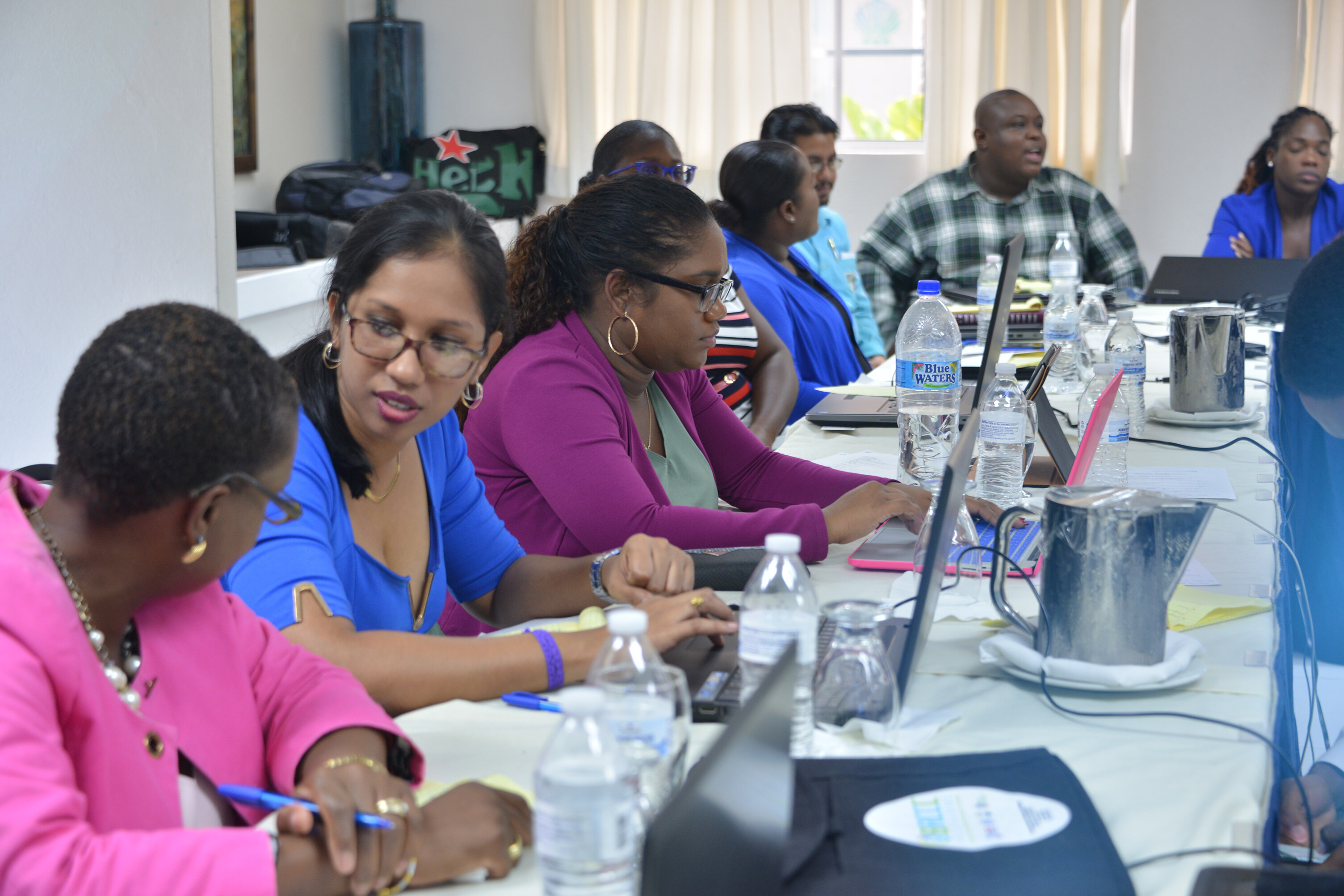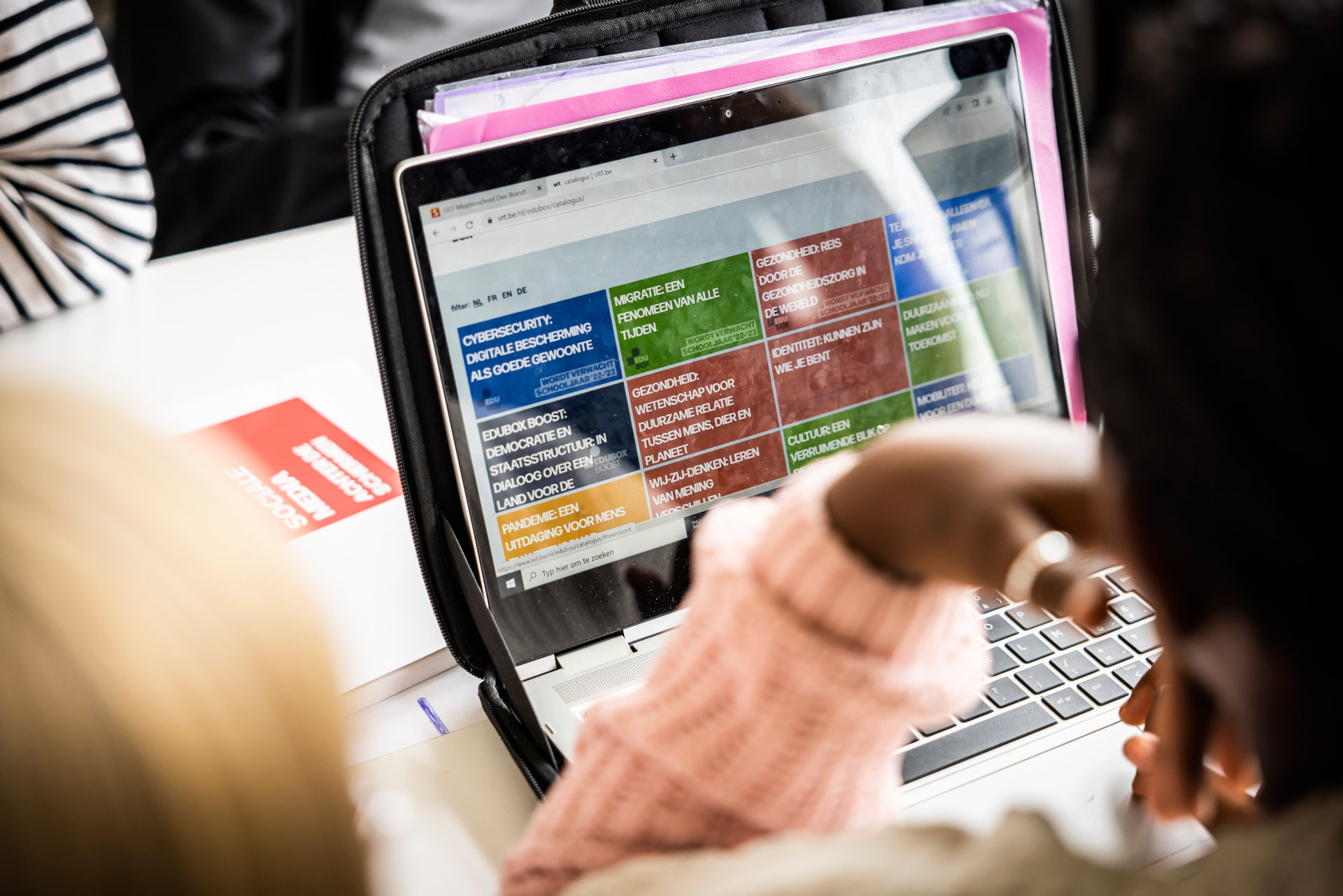INTERVIEW
In conversation with UNESCO: How media literacy is empowering Caribbean youth
29th November 2024
Initiatives like the Public Media Alliance’s media literacy project are unlocking new possibilities for young people in the region, says Paul Hector of UNESCO Caribbean.

In early November the Public Media Alliance kicked off its series of in-country activities as part of the “Building the Caribbean’s Next Generation of Media Literate Citizens” project. Since then, our Project & Advocacy Coordinator, Desilon Daniels, alongside facilitators Kiran Maharaj of the Media Institute of the Caribbean and Nazima Raghubir of the Association of Caribbean Media Workers, have engaged with hundreds of students from eight primary and secondary schools and a community college. In Barbados, Jamaica, and Trinidad & Tobago, the visiting team led discussions on students’ use of digital technology, ran games to help them better understand media literacy terms, and guided them through exercises that provided insight into the news production process and the role of a journalist. The team will next bring these activities to Guyana, where more than 100 students will take part in assemblies, a MIL Pop-Up, and a studio tour at NCN Guyana.
Beyond the in-country activities, PMA and its partners will also host two virtual sessions: firstly, a regional consultation on 10 December, and a project evaluation session on 27 January 2025. For these sessions, interested persons are asked to email info@publicmediaalliance.org by 6 December 2024 and 10 January 2025, respectively.
In Jamaica, representatives from the UNESCO Office for the Caribbean joined the facilitating team as they hosted an assembly and MIL pop-up at the Green Pond High School on 12 November. Among the representatives was Paul Hector, Advisor for the Communications and Information Sector. At UNESCO Caribbean’s office in Kingston, Hector spoke with Desilon about the importance of media literacy in empowering Caribbean youth with critical thinking and digital skills, the role of collaboration in sustaining long-term media literacy initiatives, and how hands-on interactive approaches like PMA’s ‘Thumbs Down’ game can serve as the foundation for enhanced student engagement and peer-to-peer learning.
Desilon Daniels: What are UNESCO’s main goals for this project, and how does it fit into UNESCO’s broader mission in the Caribbean?
Paul Hector: Today, digital technologies are really part and parcel of everything that we do, and we see individuals having a lot more power in terms of being able to spread their messages more widely. Of course, we’re happy to see young people very much engaged in this process, and we recognise that with this sort of power comes responsibilities. So, how do you make sure that these tools, which can help people to come together, do that and not be used to sort of divide?
So, again, making sure that people have the sort of awareness and the competencies to use the technologies. Also the sort of reflectiveness to really consider the consequences of their actions and then do things which promote [media literacy]. I think for the Caribbean, we have a big focus right now on youth in our strategic plan – youth, environment and climate change, and also digital transformation. And so MIL, it’s really something which contributes to helping people be part of this knowledge society and to participate, as I said, in a very thoughtful way; one which considers not only themselves, but also others within their community.
DD: You’ve just spoken about UNESCO’s focus on youths, and you also attended one of the project sessions here in Jamaica. What struck you the most about the students’ engagement with the media literacy concepts that we spoke about at that session?
PH: I think I think the sort of dynamism that they had, also the way in which they could relate what we are talking about to experiences in their lives, for example, where we talk about misinformation and how this impacts people. They were able to talk about not about things they had seen on TV, but in their own communities, people who had experienced negative consequences of misinformation, lies, being told about them, how it impacted them. And I think this really helped them in a way to relate more closely to this whole issue of being thoughtful about what you share, when you share, where you share and so on.

PH: I think one of the one of the big challenges is that we have small communities. So you find in many places people are wearing multiple hats. So it’s very easy to, for example, start projects because at the beginning there’s a lot of energy. There’s a lot of enthusiasm. But then how do you maintain this going along, especially when you have other demands on your time, on your resources, etcetera? So to me, this is something that I see as a challenge. And so linking whatever we are doing to, let’s say, multiple organisations, multiple persons, because by creating a sort of a team, then maybe on the particular day that, that I’m not feeling so enthusiastic, somebody else is more enthusiastic. So maybe I can draw from the energy. And the same thing with organisations; we can sort of bolster and reinforce each other. So collaboration, I think this is really key for the long term.

DD: And going back to the session that you witnessed. So you saw us premiere the ‘Thumbs Down’ game. How do you think the activity like that thumbs down game and the pop-up benefit students in understanding media and information literacy and its importance?
PH: I think there’s a saying which goes something like show me, and I’ll remember. Tell me, I remember, show me. You know, when I do, it sort of builds this sort of longer term memory. So I think that’s where this wins because, you know, it’s one thing you can hear someone to talk about something. You can see a video and of course, that’s great. But then when you are given the cards and you now have to explain to someone what is meant by this particular term, then you start internalising, you start reflecting on what you’ve heard. It’s also fun. So by being fun, it makes learning much easier so I think this is really a fantastic way of helping people to really engage with these concepts.
Listen toour podcast
Uncovering and exploring the biggest
issues facing public media
DD: What impact are you hoping to see from the in-country activities of students and educators? Because we still have Trinidad to go. We still have Guyana to go. So at the end of November, when we’ve visited all the countries, what impact are you hoping for?
PH: Well one of the things we’ve seen is that, I mean, already there’s a lot of things that people need to learn. The curriculums are full, and the space for more topics isn’t really there. And we’ve had a challenge, I must say, in terms of getting email integrated into the schools. So I think this sort of hands-on activity, where people see this as something which is enjoyable, which is fun, but also very important. I think this can maybe sort of tap into that sort of energy and give rise to the sort of possibilities where more people want to do this, more people want to engage, and if not perhaps within the mainstream curriculum, then having this as maybe an activity which is after school. I think this is really key. But again, also by exposing students to this, I think we have the possibility of unlocking that sort of potential of peer-to-peer learning and I hope that these kids, with their social media, they will each one teach, one tell one and we can have the sort of network effect where word spreads organically from the bottom up. And I think in the end, that’s the key for long-term success.


DD: You’ve already mentioned the importance of collaboration, so I want to learn more about how important it is to involve educators and regional stakeholders in this media literacy initiative. What role do you see of them helping to sustain this kind of work?
PH: Well, I think in the Caribbean we have lots of similarities, but at the same time lots of differences. And I think by having these projects running in different countries, we’re able to see, I think, maybe more cases, more practices, more solutions being developed, which in turn, for those who are coming into this space, it shows that maybe if you think of it as a buffet, you just have lots more choices. And so I think this is something which then allows people to sort of pick and choose, to tailor, to realise that there can be a lot of flexibility. And I think if we can have within countries these different things trialled, I think it’s something which can also help to stimulate the conversation at the local level between different parishes, different places, and also regionally across different islands. And then I think, if we look at the sort of like a larger collective, then I think it’s possible to find something which is maybe something Caribbean in all of this.
“media and information literacy, it’s really about empowerment, actualising yourself, helping you to learn from others, to also to share with others.”
DD: I do want to know, if you are able to tell us, a little bit about UNESCO’s plan to support ongoing media literacy efforts beyond this project’s timeframe. Where does UNESCO want to take media literacy work in the Caribbean?
PH: We have a global mandate, and part of this mandate has to do with peace and sustainable development for everyone. And if we think about it, the better information we have, I think the better decisions we can make. The better decisions we make, the better outcomes of results that we can get. And again, and MIL, it’s really at the heart of empowering people, giving them those sort of capabilities not only to access information, but to also critically examine it, to create things, to share.

Today, I think many of the problems, the big problems that we need to deal with, it’s not an individual who can solve this. We need multiple persons. And having those capabilities of interacting with this information, using it, applying it, sharing it, creating, developing, learning from others, innovating. I think that’s really at the bottom of solving those bigger problems, living together, and co-existing.
DD: And speaking of living together and coexisting, my last question: what message would you like to share with Caribbean students, educators, families about the value of media literacy?
PH: I think media and information literacy, it’s really about empowerment, actualising yourself, helping you to learn from others, to also to share with others. And as I said, those skills like critical thinking, those are soft skills, which I think in every walk and space of life will serve you well. So I think it’s an essential part of your toolkit for life.
Related Posts
1st October 2024
Join PMA and UNESCO in shaping the future of Caribbean media literacy
The Public Media Alliance will conclude…
9th July 2024
Building media literacy: educators and journalists engage in UNESCO-supported bootcamps in the Caribbean
In this UNESCO article, we take a look…
6th June 2024
First Caribbean media literacy bootcamp kicks off
Public Media Alliance will today begin…




